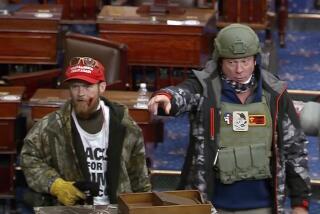Airman Gets 25 Years in Theft of Spy Plane Secrets
BEALE AIR FORCE BASE, Calif. — An Air Force enlisted man found guilty of passing secrets about a secret spy plane to FBI agents posing as Soviet spies was sentenced Thursday to 25 years in prison, five years more than was sought by prosecutors.
The court-martial judge, Lt. Col. Howard Sweeney, also reduced Airman 1st Class Bruce Ott to the lowest rank in the Air Force, gave him a dishonorable discharge and ordered forfeiture of his pay.
Ott could have been sentenced to 32 years in prison. The prosecution had asked for a 20-year sentence, while the defense argued for eight years behind bars for the man, who had been portrayed as being mentally ill.
Asked by news reporters if the tough sentence indicated that the judge was making an example of Ott, Lt. Col. James Swanson, Beale AFB’s staff judge advocate, said, “The objectives of our system of justice are shared by the larger system of American justice: to punish wrongdoing and to deter criminal conduct.”
Eligible for Parole
Swanson said Ott, 26, of Erie, Pa., would probably become eligible for parole in about eight years.
Swanson said the convicted spy will remain confined at Beale, about 100 miles northeast of San Francisco, for the next two months while his case is reviewed by Lt. Gen. James E. Light Jr., commander of the 15th Air Force, headquartered at March Air Force Base near Riverside.
The conviction and sentence also will be reviewed by the Air Force Court of Military Review in Washington. If upheld, the case will then go to the U.S. Court of Military Appeals. The final step in the appellate process is the U.S. Supreme Court.
Swanson said that Light will determine where Ott will ultimately be confined--probably Ft. Leavenworth, Kan.
Ott stood during sentencing and made no comment. His sister, Stephanie, appeared to be fighting back tears. Ott’s wife, Shellie, and his parents, Mr. and Mrs. John Ott of Waterford Pa., also were in the courtroom.
Arrested at Motel
Ott was arrested Jan. 22 in a Davis, Calif., motel when he allegedly passed a copy of an Air Force Strategic Air Command regulation relating to the SR-71 spy plane to two FBI agents posing as Soviet spies.
He was found guilty of contacting the Soviet Consulate in San Francisco without prior permission and taking a Strategic Air Command regulation document with reason to believe that it would be used to injure the United States.
He also was found guilty of passing a copy of an Air Force unit recall roster to an FBI agent on Jan. 13 during another clandestine rendezvous.
Military prosecutors contended that Ott hoped to be paid as much as $160,000 for his work as a spy.
More to Read
Sign up for Essential California
The most important California stories and recommendations in your inbox every morning.
You may occasionally receive promotional content from the Los Angeles Times.










